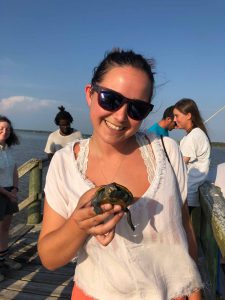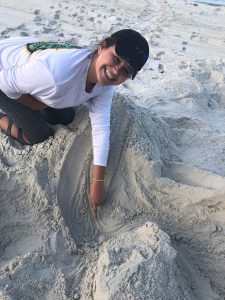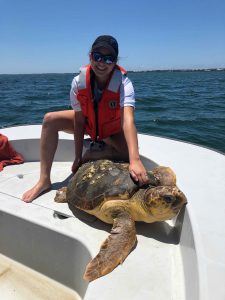My Summer Internship: Gabbi Obando

Gabbi Obando is an undergraduate WEC student and a Doris Duke Conservation Scholar.
What is the Doris Duke Conservation Scholars Program?
Doris Duke is a program funded through a charitable foundation that was originally started by an heiress who got her money from the tobacco industry and chose to use her wealth to promote education of the arts and sciences throughout society.
The particular program that I’m in is focused on integrating students of different backgrounds to focus on the value of diversity and inclusion within the conservation field.
You just finished the Leadership Week stage of the program. What was your experience with that?
The leadership week is so difficult to put into words. It was such an amazing experience, bringing together all these students from the five universities, University of Arizona, University of Idaho, NC State, Cornell and of course, UF. We started off with a camping experience in the woods, staying in cabins, making bonfires, and getting to know each other. We took a day trip out to DC, and I was in the group that went to the Smithsonian Natural History Museum. I also got to see the National Mall for the first time.
That time was all spent getting comfortable with everybody.
I have never been able to relate and connect with a group of students so quickly and comfortably as I did with the other students on the trip. We all have this huge passion for conservation and desire to connect the public with science in a way that it’s not overwhelming or uncomfortable.
It was really interesting too, because we weren’t all bio or ecology majors. There were some that were environmental engineering, some were environmental law, and although our paths will take different turns, it was wholesome to see how far and wide this conservation ethic can be spread throughout our society.

How did you become interested in wildlife and ecology? Do you have an origin story?
I grew up near the Savannas Preserve State Park in Port St. Lucie, and I was always very intrigued with the outdoors. We had lizard eggs throughout my garage and household, an occasional coyote (and once a Florida panther!) would move through our backyard, and I always loved to look at the tracks to see where they were heading.
One day a park ranger moved next door. Her name was Tessa, and she worked at the state park.
Seeing her, it clicked for me that I could make a career from my passion. She was so kind and willing to teach me. She brought me to the facility, and would let me handle snakes and turtles. From that time, I followed this direction.
As much as I loved her bringing me out to the scrub, I’ve always had a marine focus. I always gravitated to the estuaries and beaches, and she would take the time to teach me about those places, too. I have to give Tessa some credit for helping me build this interest.
It’s great that you had a mentor growing up!
Especially because, while I wouldn’t say my family isn’t environmentally focused, their careers have never been science-based, and I think a lot of us in this field can relate to the idea that our families might discourage us from pursuing a career in wildlife, given that it’s not the most lucrative position.
We’re not aiming to be millionaires going into this field, but we do it for the fulfillment and happiness of working towards a bigger and brighter future.
I wouldn’t say my family is unsupportive, but they’re definitely curious as to where this will take me.
What are you doing for your internship?
Right now, I am living my dream! I’m out in Port St. Joe, helping with a study that has been going on for decades, looking at nesting behaviors and special ecology along the northern Gulf coast of Florida of loggerheads, Kemp’s ridleys, and green sea turtles.
I’m also assisting Dan the graduate student with his master’s work on terrapins. We’re trying to fill in a gap in our knowledge with regards to terrapins in the Gulf, humans’ impact on them, and the general patterns of how they live their lives here.
Something else I appreciate is doing outreach with the Florida Conservation Corps.
Doing both marine science and public education in one internship is a dream come true.
Anything else you’d like to share?
I’d like to say again how appreciative I am of Doris Duke program.
It’s taught me so much about conservation biology, but also the wonderful influences that diversity and inclusion can have on this field. It’s totally changed my way of thinking, and I’m so privileged and excited to continue my work with this idea in mind.

 0
0
